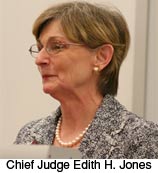1/25/2012
Texas: Federal Appeals Court Defends Anti-Camera ReferendumFifth Circuit US Court of Appeals reverses judge who overturned result of anti-camera referendum in Houston, Texas.

The US Court of Appeals for the Fifth Circuit on Tuesday rebuked a lower court judge who had taken extraordinary measures to protect the red light camera program in Houston, Texas. A three-judge panel ruled that US District Court Judge Lynn N. Hughes erred last June when he blocked the organizers of an anti-camera referendum from participating in the court proceedings that Hughes used to nullify the election results (view ruling).
Houston had hired American Traffic Solutions (ATS) to operate issue red light camera tickets on the city's behalf through May 27, 2014. The program was one of the largest in the country until Francis and Randy Kubosh gathered enough signatures to place a charter amendment on the ballot banning automated ticketing machines. Voters approved the measure in November 2010.
Houston officials, who sought to keep the cameras running despite the vote, filed a lawsuit against ATS, which also sought to keep the cameras running. They brought the case before Judge Hughes, who has served along side the father of ATS General Counsel George Hittner for the past twenty-five years. Last year, Hughes insisted that he would be able to detect whether Houston made any attempt to lose the case to ATS intentionally and denied the right of the Kuboshes to defend their ballot measure. The appellate judges tore apart Hughes' reasoning, especially after ATS and Houston's lawyers sat together at the same table during oral arguments.
"There is no federal authority nor state law prohibiting intervention of right in this type of case," Chief Judge Edith H. Jones wrote for the appellate panel. "These intervenors are unique because they engineered the drive that led to a city charter amendment over the nearly unanimous, well funded, and longstanding opposition of the mayor and city council... They have raised substantial doubts about the city's motives and conduct in its defense of the litigation with ATS. Without these intervenors' participation, the city might well be inclined to settle the litigation on terms that preserve the adverse ruling on the charter amendment and thus preserve its flexibility to reinstate red light cameras in the future. This is no matter of simply defending city policy of one sort or another: it involves millions of dollars of revenue to city coffers during a period of considerable economic uncertainty."
The prediction that the city would rush toward an adverse settlement turned out to be correct. On Friday, the city agreed to settle with ATS for $4.8 million in a move that would allow the cameras to return at any time the city council chooses. The appellate court complained that it only recently had learned about this settlement "via the newspaper."
The appellate ruling focused solely on the question of whether the Kuboshes should have been parties to the litigation between Houston and ATS from the start. The panel ordered the issue should be reconsidered at a new trial where the Kuboshes would be able to defend their initiative. The appeals court signaled with their language that they did not share the view that the public vote merely meant "people in Houston want to run red lights," as Hughes said in proceedings on November 26. Instead, the court referred to the "haste of the litigation" that Judge Hughes placed "on a fast track" in a way that suited "the city's pecuniary motives." The sponsors of the initiative vowed Tuesday to ensure Houston officials can never bring back cameras.
"ATS just must have said to Houston, 'Whatever you do, do not allow the election results to stand,'" Citizens Against Red Light Cameras spokesman Philip Owens told TheNewspaper. "It ended today with the court ruling because the Kuboshes aren't going to stop until those election results stand. That's it for ATS. They lost."
A copy of the interlocutory ruling is available in an 85k PDF file at the source link below.


